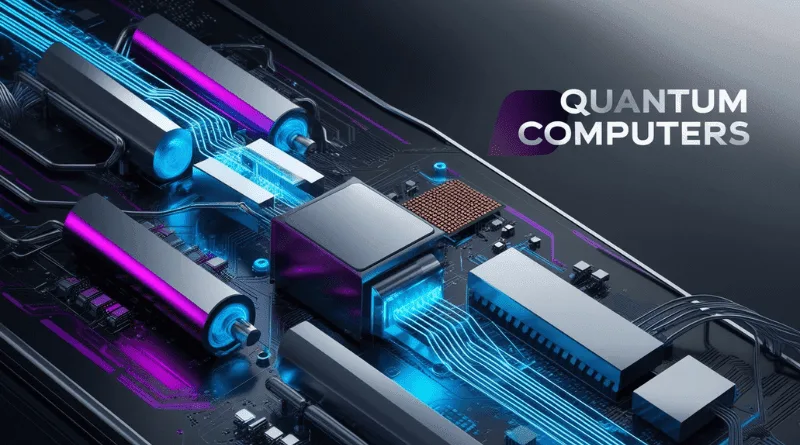Quantum Computing: The Future of Supercomputing in the Age of Artificial Intelligence

;Quantum computing represents a paradigm shift in technology, promising computing capabilities far beyond what conventional computers can achieve. While the computers we use today rely on “bits” that store information as either 0 or 1, quantum computers leverage quantum mechanical principles, such as superposition and entanglement, to represent information using “quantum bits” or “qubits.” This enables them to process massive amounts of data and solve complex problems in parallel, something previously considered impossible.
The ability of qubits to be both 0 and 1 simultaneously (thanks to superposition) and the non-local connection of qubits to each other through entanglement opens up unprecedented possibilities in areas such as drug discovery, the development of new materials, the improvement of artificial intelligence, and even the breaking of current encryption. We are on the cusp of a new era that could radically change our understanding of science and technology.
The Relationship of Quantum Computing to Artificial Intelligence
The basic idea behind quantum artificial intelligence (Quantum AI) or quantum machine learning (QML) is to harness the unique power of quantum computing to improve and accelerate existing AI algorithms, opening up entirely new horizons in this field.
How can quantum computing enhance AI?
Modern AI, particularly machine learning and deep learning, requires processing massive amounts of data and performing extremely complex calculations. This is where quantum computing excels with its superior capabilities for:
Handling large and complex data:
· Superposition: Quantum bits allow multiple states to be represented simultaneously. This means that a quantum computer can encode a vast amount of data into a few quantum bits, enabling it to process much larger and more complex datasets than conventional computers.
· Parallel processing: Quantum computers can explore a large number of possible solutions in parallel, which is essential for AI algorithms that often require searching vast spaces of possibilities, such as training neural networks.
Accelerating Machine Learning Algorithms:
· Quantum Optimization Algorithms: Quantum computing could significantly improve some of the optimization algorithms used to train machine learning models.
· Quantum Neural Networks (QNNs): Research is currently underway to develop neural networks based on the principles of quantum mechanics, in which quantum bits act as quantum neurons. These networks have the ability to process certain types of complex data more efficiently.
· Quantum Reinforcement Learning: Quantum computing could improve reinforcement learning algorithms, used to train systems to make decisions in complex environments such as robotics or autonomous driving systems.
Improved Data Analysis and Pattern Detection:
· Pattern Recognition: Quantum machine learning algorithms may be better able to detect complex and unobtrusive patterns in large datasets, which is vital for applications such as image recognition, natural language processing, and recommendation systems.
· Simulation Modeling: Quantum computers can simulate complex systems such as molecules, materials, and biological processes, with unprecedented accuracy. These simulations provide extremely rich training data for AI models, leading to more accurate and effective models in areas such as drug discovery and materials development.
Potential Applications of Quantum Artificial Intelligence
The synergy between quantum computing and artificial intelligence promises to revolutionize many sectors, most notably:

Drug Discovery and Healthcare:
Accelerating simulations of molecular interactions, discovering new drug compounds, and developing personalized treatments.
Materials Science:
Designing new materials with unique properties by simulating the behavior of atoms and molecules.
Financial Services:
Improving risk management, optimizing investment portfolios, and detecting fraud by analyzing complex financial data at ultra-high speed.
Logistics and Supply Chain Management:
Optimizing delivery routes, managing inventory, and improving the efficiency of complex supply chains.
Optimization:
Solving challenging optimization problems in fields ranging from manufacturing to smart city planning.
Generative AI:
Quantum computing could contribute to the creation of more complex generative models capable of understanding and generating data such as images, text, and music in ways never before possible.
Cybersecurity:
Developing more secure cryptographic algorithms, known as “quantum resistance,” which may also help break traditional encryption.
The latest products in the field of quantum computing
The quantum computing market is witnessing intense competition and rapid developments, and there are many major and emerging companies producing or developing quantum processors with various technologies.
Here are the most prominent companies and technologies in this field:
· Willow: Google’s latest chip, featuring 105 superconducting qubits with a strong focus on quantum error correction and scaling.
· Sycamore: The chip that achieved “quantum supremacy” in 2019 with 54 qubits. Sycamore remains a landmark achievement and the foundation of Google’s ongoing research.
Google’s core technology: Superconducting Transmon Qubits.
IBM
· Heron: IBM’s latest processor, with 133 qubits, is designed to be modular and scalable for larger systems. IBM is focused on building “quantum-centric supercomputing” systems that combine the power of quantum and classical computing.
· Eagle: IBM surpassed 100 qubits (127 qubits) in 2021.
· Osprey: A 433-qubit processor.
· Condor: A 11,21-qubit processor (announced as part of the roadmap).
IBM’s core technology: Transmon superconducting qubits.
Intel
Intel, a giant in the classical processor industry, is investing heavily in quantum computing, focusing on manufacturability and integration with existing semiconductor technologies.
· Tunnel Falls: Intel’s latest silicon spin qubit chip, with 12 qubits. This technology is capable of being manufactured in large quantities using existing CMOS technologies.
· Horse Ridge: A programmable quantum control chip for simplified qubit control.
· Tangle Lake: A previous superconducting chip with 49 qubits.
Intel’s core technology: silicon spin qubits and superconducting qubits.
Key Challenges in Developing Quantum Computers
Despite the impressive achievements in quantum computing, there are still several fundamental challenges that hinder the development of robust and reliable quantum computers on a large scale. Here are the most important ones in brief:
· Quantum bits are highly sensitive to noise and interactions with their environment, such as heat, electromagnetic vibrations, and magnetic fields. These interactions destroy their fragile quantum states (superposition and entanglement), leading to rapid loss of quantum information. To preserve quantum bits, most technologies require cooling them to temperatures very close to absolute zero.
· Due to the instability of quantum bits, errors constantly occur. Quantum error correction is a highly complex process, requiring the use of a very large number of “physical” quantum bits to represent a single “logical” quantum bit (i.e., an error-free quantum bit). This significantly increases hardware requirements.
· Building and connecting large numbers of high-quality quantum bits while preserving their quantum properties is an extremely difficult challenge. As the number of quantum bits increases, the challenges of control, cooling, and isolation increase, and the quality of individual quantum bits decreases.
· Handling quantum bits and performing operations (quantum gates) on them requires a high level of precision and control. Reading the states of quantum bits without destroying their quantum state (measurement) is also a complex technical challenge.
· More quantum algorithms still need to be developed that can harness the power of quantum computers to solve practical and useful problems. Not all problems will benefit from quantum computing, and there is a need to understand where true “quantum supremacy” can be achieved.
· Quantum computers are not just chips; they are integrated systems that include complex cooling devices such as dilute refrigerators, microcontroller electronics, middleware, and integrated infrastructure, all of which must work in harmony in an extremely complex environment.
Note
Despite the tremendous potential we see today, quantum AI is still in its early stages, and its development faces significant challenges, including building stable and scalable quantum hardware, developing robust quantum algorithms, and effectively integrating it with traditional AI systems.
However, massive investments and ongoing research, such as Google’s Willow chip and its achievements in error correction, herald a promising future for the field.
Also read:
l should-you-buy-bitcoin-now-or-is-it-too-late-in-2025
l a-self-driving-tesla-taxi-crashes-into-a-parked-vehicle
l a-chinese-humanoid-robot-cooks-using-virtual-reality
l brain-computer-interfaces-when-telepathy-becomes-a-technological-reality




